Books by Blake D Scott
This book recasts the way that philosophers understand rhetoric. Rather than follow most philosop... more This book recasts the way that philosophers understand rhetoric. Rather than follow most philosophers in conceiving rhetoric as a specific way of speaking or writing, it shows that rhetoric is better understood as a dimension of all human discourse and action. It is motivated by the debate between Badiou and Cassin about philosophy's relation to rhetoric. The identifies the common target of Badiou's and Cassin's otherwise incompatible critiques: rhetoric's conception of audience. The book then turns to rhe "new rhetoric" project of Perelman and Olbrechts-Tyteca and the hermeneutic philosophy of Ricoeur in search of an expanded conception of audience.

Routledge, 2024
https://www.routledge.com/The-Rhetoricity-of-Philosophy-Audience-in-Perelman-and-Ricoeur-after-th... more https://www.routledge.com/The-Rhetoricity-of-Philosophy-Audience-in-Perelman-and-Ricoeur-after-the/Scott/p/book/9781032684871#
This book aims to recast the way that philosophers understand rhetoric. Rather than follow most philosophers in conceiving rhetoric as a specific way of speaking or writing, it shows that rhetoric is better understood as a dimension of all human discourse and action—what the author calls “rhetoricity”.
This book provides the first philosophical treatment of rhetoricity. It is motivated by two ongoing developments. The first is the debate between Alain Badiou and Barbara Cassin about philosophy’s relation to rhetoric. Both Badiou and Cassin are critical of rhetoric, albeit for different reasons. Second, there has been a growing resurgence of interest in rhetoric considering the recent rise in authoritarian politics as well as new forms of propaganda driven by “persuasive technologies”. This book identifies the common target of Badiou’s and Cassin’s otherwise incompatible critiques: rhetoric’s conception of audience. It offers a fresh take on the “new rhetoric” project of Chaïm Perelman and Lucie Olbrechts-Tyteca, putting their work into conversation with the Badiou-Cassin debate. The book then turns to the hermeneutic philosophy of Paul Ricoeur in search of an expanded conception of audience. It shows that Ricoeur’s hermeneutic philosophy allows us to extend Perelman and Olbrechts-Tyteca’s psychological notion of audience to texts themselves, and to argue that human beings have a rhetorical capacity to reflect on audiences in search of what is potentially persuasive.
The Rhetoricity of Philosophy will be of interest to scholars and advanced students working in contemporary European philosophy, rhetoric, argumentation studies, and social theory.
https://www.routledge.com/The-Rhetoricity-of-Philosophy-Audience-in-Perelman-and-Ricoeur-after-the/Scott/p/book/9781032684871#
Peer-reviewed Articles by Blake D Scott

Philosophy & Rhetoric, 2024
Despite Perelman and Olbrechts-Tyteca’s well-known influence on argumentation studies, it is stri... more Despite Perelman and Olbrechts-Tyteca’s well-known influence on argumentation studies, it is striking that their theory of argumentation no longer stands out as a living project in the field. On the one hand, critics argue that their theory is inherently relativistic and therefore incapable of aiding argument evaluation. On the other hand, critics argue that, even as a descriptive theory, it fails to sufficiently justify its own systematic ambitions. This article addresses these dual concerns by returning to one of the most neglected yet most innovative aspects of Perelman and Olbrechts-Tyteca’s theory of argumentation—its rhetorical methodology. Reconstructing two key aspects of this methodology in phenomenological terms, the author discusses that the theory of argumentation found in The New Rhetoric is a philosophically neutral framework for describing the already norm-laden practice of argumentation.

Informal Logic, 2024
2023 Winner of the Association for Informal Logic and Critical Thinking (AILACT) Essay Prize
htt... more 2023 Winner of the Association for Informal Logic and Critical Thinking (AILACT) Essay Prize
https://wordpress.com/page/ailact.wordpress.com/179
Abstract: It is widely believed that Perelman and Olbrechts-Tyteca's theory of argumentation is vulnerable to the charge of relativism. This paper provides a more charitable interpretation of Perelman and Olbrechts-Tyteca's normative views, one that properly considers the historical trajectory of their work and a wider range of texts than existing interpretations. It is argued that their views are better characterized as a form of "contrastivism about arguments" than any kind relativism. This more accurate depiction contributes to ongoing efforts to revive interest in Perelman and Olbrechts-Tyteca's work as well as build bridges with trends in contemporary argumentation theory.
Résumé: Il est largement admis que la théorie de l'argumentation de Perelman et Olbrechts-Tyteca est vulnérable à l'accusation de relativisme. Cet article propose une interprétation plus charitable des vues normatives de Perelman et Olbrechts-Tyteca, une interprétation qui considère correctement la trajectoire historique de leur travail et un éventail de textes plus large que les interprétations existantes. On fait valoir que leurs opinions sont mieux caractérisées comme une forme de « contrastivisme sur les arguments » que comme n'importe quelle sorte de relativisme. Cette représentation plus précise contribue aux efforts en cours visant à raviver l'intérêt pour le travail de Perelman et Olbrechts-Tyteca ainsi qu'à établir des ponts avec les tendances de la théorie contemporaine de l'argumentation.

Argumentation, 2023
Argumentation as the public exchange of reasons is widely thought to enhance deliberative interac... more Argumentation as the public exchange of reasons is widely thought to enhance deliberative interactions that generate and justify reasonable public policies. Adopting an argumentation-theoretic perspective, we survey the norms that should govern public argumentation and address some of the complexities that scholarly treatments have identified. Our focus is on norms associated with the ideals of correctness and participation as sources of a politically legitimate deliberative outcome. In principle, both ideals are mutually coherent. If the information needed for a correct deliberative outcome is distributed among agents, then maximising participation increases information diversity. But both ideals can also be in tension. If participants lack competence or are prone to biases, a correct deliberative outcome requires limiting participation. The central question for public argumentation, therefore, is how to strike a balance between both ideals. Rather than advocating a preferred normative framework, our main purpose is to illustrate the complexity of this theme.
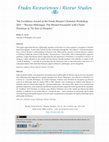
Études Ricoeuriennes/ Ricoeur Studies , 2021
Winner of the Excellence Award at the 2021 edition of the Fonds Ricœur's Summer Workshop
Abstr... more Winner of the Excellence Award at the 2021 edition of the Fonds Ricœur's Summer Workshop
Abstract: This paper argues that Ricœur’s philosophy operates on the basis of a more expansive conception of rhetoric than it first appears. To show this, I reread The Rule of Metaphor through the “new rhetoric” of Chaïm Perelman. First, I survey Ricœur’s understanding of rhetoric in the 1950s and 60s. Second, I examine Ricœur’s relation to Perelman within the context of the broader “rhetorical turn” of the 1970s. After examining their respective positions, I argue that Ricœur fails to appreciate the full significance of Perelman’s conception of audience. In doing so, I draw attention to the central role that Ricœur himself ascribes to the audience or reader in the “work of meaning.” I conclude by proposing that the rhetorical triad of logos/ethos/pathos may serve as a conceptual matrix with which the rhetorical aspects of Ricœur’s philosophy can be interpreted.
***
Lauréat du Prix d’excellence de l’édition 2021 des Ateliers d’été du Fonds Ricœur.
Résumé: Dans le présent article, nous proposons de montrer que la philosophie de Ricœur repose sur une conception de la rhétorique plus large qu’il n’y paraît à première vue. Pour le démontrer, nous relisons La Métaphore vive à travers la « nouvelle rhétorique » de Chaïm Perelman. D’abord, nous abordons la conception que Ricœur avait de la rhétorique dans les années 1950 et 1960. Ensuite, nous examinons la relation entre Ricœur et Perelman dans le contexte plus large du « tournant rhétorique » des années 1970. Après avoir examiné leurs positions respectives, nous soutenons que Ricœur ne parvient pas à apprécier toute la portée de la conception de l’auditoire chez Perelman. Ce faisant, nous attirons l’attention sur le rôle central que Ricœur lui-même attribue à l’auditoire ou au lecteur dans le « travail du sens ». Nous concluons en proposant que la triade rhétorique logos/ethos/pathos puisse servir de cadre conceptuel pour interpréter les aspects rhétoriques de la philosophie de Ricœur.
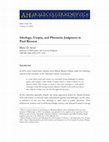
Analecta Hermeneutica, 2021
In this paper I trace Ricoeur’s reflections on ideology and utopia from his Lectures on Ideology ... more In this paper I trace Ricoeur’s reflections on ideology and utopia from his Lectures on Ideology and Utopia, first delivered in 1975, to his later writings on selfhood and the just from the 1990s. The thread that I follow begins from the closing lines of Ricoeur’s Lectures, wherein he suggests that “practical wisdom” (or phronesis) may provide an answer to the paradox of ideology. Taking this suggestion as my point of departure, I reread Ricoeur’s earlier solution to this problem back from the vantage point of his later writings, where his conception of phronesis is further developed. Although these later writings are not immediately concerned with ideology, Ricoeur’s idea of “phronetic judgment” can still be understood within the earlier problematic. As I argue, Ricoeur’s concept of phronetic judgment helps to consolidate his earlier solution to the problem of ideology within his later, more systematic reflections on ethics, politics, and practical philosophy. Although Ricoeur’s reflections on ideology and utopia have been subject to considerable scrutiny, commentators typically discuss them within the context of his writings from the same period. The longer view that I adopt here therefore not only sheds light on questions of continuity in Ricoeur’s political thought, but may also stimulate further interest in his contribution to ideology critique and contemporary critical theory more broadly.
Sartre Studies International, 2020
This paper re-examines the well-known problem of how it is possible to have an “intuition of abse... more This paper re-examines the well-known problem of how it is possible to have an “intuition of absences” in Sartre’s example of Pierre. I argue that this problem is symptomatic of an overly theoretical interpretation of Sartre’s use of intentionality. First, I review Husserl’s notion of evidence within his phenomenology. Next, I introduce Sartre’s Pierre example and highlight some difficulties with interpreting it as a problem of perception. By focusing on Sartre’s notion of the project, I argue instead that the problem is better understood at the level of action. In support of this interpretation, I conclude with a brief comparison to the early work of Paul Ricoeur. By borrowing some of Ricoeur’s phenomenological vocabulary tailored to action, I reinterpret Sartre’s example as a practical problem.
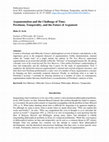
Argumentation, 2019
Central to Perelman and Olbrechts-Tyteca's philosophical revival of rhetoric and dialectic is the... more Central to Perelman and Olbrechts-Tyteca's philosophical revival of rhetoric and dialectic is the importance given to the temporal character of argumentation. Unlike demonstration, situated within the "empty time" of a single instant, the authors of The New Rhetoric understand argumentation as an action that unfolds within the "full time" of meaningful human life. By taking a broader view of his work beyond The New Rhetoric, I first outline Perelman's understanding of time and temporality and the challenge that it poses for the study of argumentation. Next, I emphasize the distinction between argumentation's internal and external temporal structures, and then show how Perelman problematizes a static view of a number of basic argumentative concepts by bringing out their essentially temporal character. Finally, in clarifying what is at stake in Perelman's account, I conclude by drawing attention to a number of issues in contemporary argumentation studies that may benefit from a reconsideration of Perelman's analysis of time.
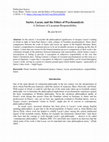
Sartre Studies International, Nov 14, 2016
In this article, I reconsider the philosophical significance of Jacques Lacan’s reading of Freud ... more In this article, I reconsider the philosophical significance of Jacques Lacan’s reading of Freud in light of Jean-Paul Sartre’s early critique of Freudian psychoanalysis. Since direct comparisons between the work of Sartre and Lacan are sparse in the English literature, Betty Cannon’s comprehensive treatment proves to be an invaluable resource in opening up this line of inquiry. I claim that one reason for the limited attention given to comparisons of their work is the continued strength of the polemics between humanism and structuralism. Lacan’s structuralism is regularly indicted by humanists for failing to provide a conception of subjective responsibility in the way that Sartre’s humanism does. Taking Cannon’s critique of Lacanian psychoanalysis on this issue as a point of departure, I argue that a conception of subjective responsibility can be found throughout Lacan’s work, serving as a point of common ground upon which further inquiry—particularly of Sartre’s later work—might begin.
Book Chapters by Blake D Scott

Place and Time in Argumentation, 2022
Central to Perelman and Olbrechts-Tyteca’s philosophical revival of rhetoric and dialectic is the... more Central to Perelman and Olbrechts-Tyteca’s philosophical revival of rhetoric and dialectic is the importance given to the temporal character of argumentation. Unlike demonstration, situated within the “empty time” of a single instant, the authors of The New Rhetoric understand argumentation as an action that unfolds within the “full time” of meaningful human life. By taking a broader view of his work beyond The New Rhetoric, I first outline Perelman’s understanding of time and temporality and the challenge that it poses for the study of argumentation. Next, I emphasize the distinction between argumentation’s internal and external temporal structures, and then show how Perelman problematizes a static view of a number of basic argu- mentative concepts by bringing out their essentially temporal character. Finally, in clarifying what is at stake in Perelman’s account, I conclude by drawing attention to a number of issues in contemporary argumentation studies that may benefit from a reconsideration of Perelman’s analysis of time.
Other Articles by Blake D Scott
This position paper of Working Group 2 of the European Network for Argumentation and Public Polic... more This position paper of Working Group 2 of the European Network for Argumentation and Public Policy Analysis (COST Action CA17132; https://publicpolicyargument.eu) reviews goals and functions of public argumentation. Drawing on a variety of disciplines, the paper introduces basic distinctions and charts out options. It is meant to guide reflection on the conceptual basis for the Action’s subsequent research regarding the analysis, evaluation, and design of public argumentation.
Invited Talks by Blake D Scott

University of Bergen, Norway (18 September 2023)
In this talk I ask how Perelman and Olbrechts... more University of Bergen, Norway (18 September 2023)
In this talk I ask how Perelman and Olbrechts-Tyteca’s work can be developed in view of one of the most pressing challenges facing contemporary argumentation theory: the increasing ubiquity of “persuasive technologies”, which calls into question the basic humanistic assumptions of traditional theories of argument. In the first part of the talk, I review Perelman and Olbrechts-Tyteca’s core concepts and general framework in The New Rhetoric (1958). As many critics take this text as their only point of reference, I then zoom out from The New Rhetoric, taking a more historical view of their work and considering a wider range of their writings. While this shift in perspective brings the broader aims of the “New Rhetoric project” (NRP) into relief, it also highlights the extent to which it remains unfinished. In a final step, I propose how we might contribute to the NRP, exploring some of the tools Perelman and Olbrechts-Tyteca provide for theorizing argumentation in complex technologically mediated environments.

University of Oslo, Norway (14 September 2023)
In this talk I ask how Perelman and Olbrechts-T... more University of Oslo, Norway (14 September 2023)
In this talk I ask how Perelman and Olbrechts-Tyteca’s work can be developed in view of one of the most pressing challenges facing contemporary argumentation theory: the increasing ubiquity of “persuasive technologies”, which calls into question the basic humanistic assumptions of traditional theories of argument. In the first part of the talk, I review Perelman and Olbrechts-Tyteca’s core concepts and general framework in The New Rhetoric (1958). As many critics take this text as their only point of reference, I then zoom out from The New Rhetoric, taking a more historical view of their work and considering a wider range of their writings. While this shift in perspective brings the broader aims of the “New Rhetoric project” (NRP) into relief, it also highlights the extent to which it remains unfinished. In a final step, I propose how we might contribute to the NRP, exploring some of the tools Perelman and Olbrechts-Tyteca provide for theorizing argumentation in complex technologically mediated environments.

Uppsala University, Sweden (12 September 2023)
Despite fundamentally disagreeing over the natu... more Uppsala University, Sweden (12 September 2023)
Despite fundamentally disagreeing over the nature of philosophy and sophistry in their ongoing debate, Alain Badiou and Barbara Cassin both agree that rhetoric is a dead end for contemporary thought. For Badiou, the proud Platonist, rhetoric’s concern with audiences and their opinions leaves it entirely divorced from truths. For Cassin, the avowed sophist, rhetoric was never anything more than a philosophical ruse designed to contain the creative power of genuine sophistic discourse. In other words, where Badiou finds rhetoric too sophistical, Cassin finds it too philosophical.
Taking these incompatible criticisms as my point of departure, I argue in this talk that rhetoric remains an indispensable area of concern for contemporary philosophy. To do so, I reinterpret Chaïm Perelman and Lucie Olbrechts-Tyteca’s New Rhetoric project using methodological insights from the hermeneutic philosopher Paul Ricœur. After clarifying the stakes of Perelman and Ricœur’s own debate, I use Ricœur to expand Perelman and Olbrechts-Tyteca’s technical notion of the “audience” – which refers to the specific way in which a discourse constructs its hearer or reader. Rather than continue to oppose philosophy and rhetoric as competing disciplines, this expanded notion of audience allows me to identify what I call the “rhetoricity” of discourse – the rhetorical dimension of human action often obscured by philosophy’s deep-rooted mistrust of its ancient rival.
What emerges from this investigation, pace Badiou and Cassin, is a picture of rhetoric as (1) a dimension of all discourse and action and (2) an integral capacity of human beings most visible in the reception and production of arguments. The most important consequence of this conception of rhetoric is that it allows philosophers to overcome the conventional opposition between philosophy and rhetoric. By adopting our view, rhetoric is no longer something “more” added on to philosophy, but an everyday capacity that philosophers also rely upon when constructing audiences.
Nankai University, China (19 May 2023)
University of Liège, Belgium (2 June 2022)

University of Amsterdam, The Netherlands (25 March 2022)
Despite Perelman and Olbrechts-Tyteca... more University of Amsterdam, The Netherlands (25 March 2022)
Despite Perelman and Olbrechts-Tyteca’s well-known influence on argumentation studies, it is striking that the theory of argumentation they present in The New Rhetoric (1958) no longer stands out as a living project in the field. On the one hand, there are those who argue that their theory is inherently relativistic and therefore incapable of offering any normative criteria of argument evaluation. On the other, there are those who argue that, even as a descriptive theory, the new rhetoric fails to sufficiently justify its own systematic ambitions. In this paper, I address these dual concerns by returning to one of the most neglected, yet most innovative aspects of Perelman and Olbrechts-Tyteca’s project — its methodology. In the first part of the talk, I outline the two main lines of criticism mentioned above. In a second step, by turning to some of Perelman and Olbrechts-Tyteca’s lesser-known writings I offer a novel interpretation of their methodology that sheds light on the often-puzzling structure of The New Rhetoric. Specifically, I focus on the methodological function of the rhetorical audience and explain its role in their theory of argumentation. I conclude by exploring the ongoing viability of their project given that it was designed to deal primarily with written texts.
CRRAR, University of Windsor, Canada (10 January 2022)
Taking the ongoing debate between Barba... more CRRAR, University of Windsor, Canada (10 January 2022)
Taking the ongoing debate between Barbara Cassin and Alain Badiou as my point of departure, in the first part of the talk I examine the conceptual stakes of what has been called the “rhetorical turn” in 20th century philosophy. What is at issue in this debate are not only different ways of reading the history of philosophy, but more specifically competing paradigms of the meaning of logos. In the second part of the talk I use the stakes of this debate to discuss a related conceptual issue in argumentation theory, namely, Wenzel’s famous triad of logical, dialectical, and rhetorical perspectives on argument. In doing so I challenge a widespread misconception about rhetoric with reference to recent commentators on Wenzel’s seminal paper.




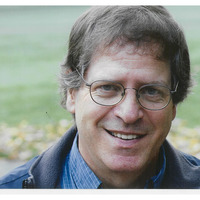






Uploads
Books by Blake D Scott
This book aims to recast the way that philosophers understand rhetoric. Rather than follow most philosophers in conceiving rhetoric as a specific way of speaking or writing, it shows that rhetoric is better understood as a dimension of all human discourse and action—what the author calls “rhetoricity”.
This book provides the first philosophical treatment of rhetoricity. It is motivated by two ongoing developments. The first is the debate between Alain Badiou and Barbara Cassin about philosophy’s relation to rhetoric. Both Badiou and Cassin are critical of rhetoric, albeit for different reasons. Second, there has been a growing resurgence of interest in rhetoric considering the recent rise in authoritarian politics as well as new forms of propaganda driven by “persuasive technologies”. This book identifies the common target of Badiou’s and Cassin’s otherwise incompatible critiques: rhetoric’s conception of audience. It offers a fresh take on the “new rhetoric” project of Chaïm Perelman and Lucie Olbrechts-Tyteca, putting their work into conversation with the Badiou-Cassin debate. The book then turns to the hermeneutic philosophy of Paul Ricoeur in search of an expanded conception of audience. It shows that Ricoeur’s hermeneutic philosophy allows us to extend Perelman and Olbrechts-Tyteca’s psychological notion of audience to texts themselves, and to argue that human beings have a rhetorical capacity to reflect on audiences in search of what is potentially persuasive.
The Rhetoricity of Philosophy will be of interest to scholars and advanced students working in contemporary European philosophy, rhetoric, argumentation studies, and social theory.
https://www.routledge.com/The-Rhetoricity-of-Philosophy-Audience-in-Perelman-and-Ricoeur-after-the/Scott/p/book/9781032684871#
Peer-reviewed Articles by Blake D Scott
https://wordpress.com/page/ailact.wordpress.com/179
Abstract: It is widely believed that Perelman and Olbrechts-Tyteca's theory of argumentation is vulnerable to the charge of relativism. This paper provides a more charitable interpretation of Perelman and Olbrechts-Tyteca's normative views, one that properly considers the historical trajectory of their work and a wider range of texts than existing interpretations. It is argued that their views are better characterized as a form of "contrastivism about arguments" than any kind relativism. This more accurate depiction contributes to ongoing efforts to revive interest in Perelman and Olbrechts-Tyteca's work as well as build bridges with trends in contemporary argumentation theory.
Résumé: Il est largement admis que la théorie de l'argumentation de Perelman et Olbrechts-Tyteca est vulnérable à l'accusation de relativisme. Cet article propose une interprétation plus charitable des vues normatives de Perelman et Olbrechts-Tyteca, une interprétation qui considère correctement la trajectoire historique de leur travail et un éventail de textes plus large que les interprétations existantes. On fait valoir que leurs opinions sont mieux caractérisées comme une forme de « contrastivisme sur les arguments » que comme n'importe quelle sorte de relativisme. Cette représentation plus précise contribue aux efforts en cours visant à raviver l'intérêt pour le travail de Perelman et Olbrechts-Tyteca ainsi qu'à établir des ponts avec les tendances de la théorie contemporaine de l'argumentation.
Abstract: This paper argues that Ricœur’s philosophy operates on the basis of a more expansive conception of rhetoric than it first appears. To show this, I reread The Rule of Metaphor through the “new rhetoric” of Chaïm Perelman. First, I survey Ricœur’s understanding of rhetoric in the 1950s and 60s. Second, I examine Ricœur’s relation to Perelman within the context of the broader “rhetorical turn” of the 1970s. After examining their respective positions, I argue that Ricœur fails to appreciate the full significance of Perelman’s conception of audience. In doing so, I draw attention to the central role that Ricœur himself ascribes to the audience or reader in the “work of meaning.” I conclude by proposing that the rhetorical triad of logos/ethos/pathos may serve as a conceptual matrix with which the rhetorical aspects of Ricœur’s philosophy can be interpreted.
***
Lauréat du Prix d’excellence de l’édition 2021 des Ateliers d’été du Fonds Ricœur.
Résumé: Dans le présent article, nous proposons de montrer que la philosophie de Ricœur repose sur une conception de la rhétorique plus large qu’il n’y paraît à première vue. Pour le démontrer, nous relisons La Métaphore vive à travers la « nouvelle rhétorique » de Chaïm Perelman. D’abord, nous abordons la conception que Ricœur avait de la rhétorique dans les années 1950 et 1960. Ensuite, nous examinons la relation entre Ricœur et Perelman dans le contexte plus large du « tournant rhétorique » des années 1970. Après avoir examiné leurs positions respectives, nous soutenons que Ricœur ne parvient pas à apprécier toute la portée de la conception de l’auditoire chez Perelman. Ce faisant, nous attirons l’attention sur le rôle central que Ricœur lui-même attribue à l’auditoire ou au lecteur dans le « travail du sens ». Nous concluons en proposant que la triade rhétorique logos/ethos/pathos puisse servir de cadre conceptuel pour interpréter les aspects rhétoriques de la philosophie de Ricœur.
Book Chapters by Blake D Scott
Other Articles by Blake D Scott
Invited Talks by Blake D Scott
In this talk I ask how Perelman and Olbrechts-Tyteca’s work can be developed in view of one of the most pressing challenges facing contemporary argumentation theory: the increasing ubiquity of “persuasive technologies”, which calls into question the basic humanistic assumptions of traditional theories of argument. In the first part of the talk, I review Perelman and Olbrechts-Tyteca’s core concepts and general framework in The New Rhetoric (1958). As many critics take this text as their only point of reference, I then zoom out from The New Rhetoric, taking a more historical view of their work and considering a wider range of their writings. While this shift in perspective brings the broader aims of the “New Rhetoric project” (NRP) into relief, it also highlights the extent to which it remains unfinished. In a final step, I propose how we might contribute to the NRP, exploring some of the tools Perelman and Olbrechts-Tyteca provide for theorizing argumentation in complex technologically mediated environments.
In this talk I ask how Perelman and Olbrechts-Tyteca’s work can be developed in view of one of the most pressing challenges facing contemporary argumentation theory: the increasing ubiquity of “persuasive technologies”, which calls into question the basic humanistic assumptions of traditional theories of argument. In the first part of the talk, I review Perelman and Olbrechts-Tyteca’s core concepts and general framework in The New Rhetoric (1958). As many critics take this text as their only point of reference, I then zoom out from The New Rhetoric, taking a more historical view of their work and considering a wider range of their writings. While this shift in perspective brings the broader aims of the “New Rhetoric project” (NRP) into relief, it also highlights the extent to which it remains unfinished. In a final step, I propose how we might contribute to the NRP, exploring some of the tools Perelman and Olbrechts-Tyteca provide for theorizing argumentation in complex technologically mediated environments.
Despite fundamentally disagreeing over the nature of philosophy and sophistry in their ongoing debate, Alain Badiou and Barbara Cassin both agree that rhetoric is a dead end for contemporary thought. For Badiou, the proud Platonist, rhetoric’s concern with audiences and their opinions leaves it entirely divorced from truths. For Cassin, the avowed sophist, rhetoric was never anything more than a philosophical ruse designed to contain the creative power of genuine sophistic discourse. In other words, where Badiou finds rhetoric too sophistical, Cassin finds it too philosophical.
Taking these incompatible criticisms as my point of departure, I argue in this talk that rhetoric remains an indispensable area of concern for contemporary philosophy. To do so, I reinterpret Chaïm Perelman and Lucie Olbrechts-Tyteca’s New Rhetoric project using methodological insights from the hermeneutic philosopher Paul Ricœur. After clarifying the stakes of Perelman and Ricœur’s own debate, I use Ricœur to expand Perelman and Olbrechts-Tyteca’s technical notion of the “audience” – which refers to the specific way in which a discourse constructs its hearer or reader. Rather than continue to oppose philosophy and rhetoric as competing disciplines, this expanded notion of audience allows me to identify what I call the “rhetoricity” of discourse – the rhetorical dimension of human action often obscured by philosophy’s deep-rooted mistrust of its ancient rival.
What emerges from this investigation, pace Badiou and Cassin, is a picture of rhetoric as (1) a dimension of all discourse and action and (2) an integral capacity of human beings most visible in the reception and production of arguments. The most important consequence of this conception of rhetoric is that it allows philosophers to overcome the conventional opposition between philosophy and rhetoric. By adopting our view, rhetoric is no longer something “more” added on to philosophy, but an everyday capacity that philosophers also rely upon when constructing audiences.
Despite Perelman and Olbrechts-Tyteca’s well-known influence on argumentation studies, it is striking that the theory of argumentation they present in The New Rhetoric (1958) no longer stands out as a living project in the field. On the one hand, there are those who argue that their theory is inherently relativistic and therefore incapable of offering any normative criteria of argument evaluation. On the other, there are those who argue that, even as a descriptive theory, the new rhetoric fails to sufficiently justify its own systematic ambitions. In this paper, I address these dual concerns by returning to one of the most neglected, yet most innovative aspects of Perelman and Olbrechts-Tyteca’s project — its methodology. In the first part of the talk, I outline the two main lines of criticism mentioned above. In a second step, by turning to some of Perelman and Olbrechts-Tyteca’s lesser-known writings I offer a novel interpretation of their methodology that sheds light on the often-puzzling structure of The New Rhetoric. Specifically, I focus on the methodological function of the rhetorical audience and explain its role in their theory of argumentation. I conclude by exploring the ongoing viability of their project given that it was designed to deal primarily with written texts.
Taking the ongoing debate between Barbara Cassin and Alain Badiou as my point of departure, in the first part of the talk I examine the conceptual stakes of what has been called the “rhetorical turn” in 20th century philosophy. What is at issue in this debate are not only different ways of reading the history of philosophy, but more specifically competing paradigms of the meaning of logos. In the second part of the talk I use the stakes of this debate to discuss a related conceptual issue in argumentation theory, namely, Wenzel’s famous triad of logical, dialectical, and rhetorical perspectives on argument. In doing so I challenge a widespread misconception about rhetoric with reference to recent commentators on Wenzel’s seminal paper.
This book aims to recast the way that philosophers understand rhetoric. Rather than follow most philosophers in conceiving rhetoric as a specific way of speaking or writing, it shows that rhetoric is better understood as a dimension of all human discourse and action—what the author calls “rhetoricity”.
This book provides the first philosophical treatment of rhetoricity. It is motivated by two ongoing developments. The first is the debate between Alain Badiou and Barbara Cassin about philosophy’s relation to rhetoric. Both Badiou and Cassin are critical of rhetoric, albeit for different reasons. Second, there has been a growing resurgence of interest in rhetoric considering the recent rise in authoritarian politics as well as new forms of propaganda driven by “persuasive technologies”. This book identifies the common target of Badiou’s and Cassin’s otherwise incompatible critiques: rhetoric’s conception of audience. It offers a fresh take on the “new rhetoric” project of Chaïm Perelman and Lucie Olbrechts-Tyteca, putting their work into conversation with the Badiou-Cassin debate. The book then turns to the hermeneutic philosophy of Paul Ricoeur in search of an expanded conception of audience. It shows that Ricoeur’s hermeneutic philosophy allows us to extend Perelman and Olbrechts-Tyteca’s psychological notion of audience to texts themselves, and to argue that human beings have a rhetorical capacity to reflect on audiences in search of what is potentially persuasive.
The Rhetoricity of Philosophy will be of interest to scholars and advanced students working in contemporary European philosophy, rhetoric, argumentation studies, and social theory.
https://www.routledge.com/The-Rhetoricity-of-Philosophy-Audience-in-Perelman-and-Ricoeur-after-the/Scott/p/book/9781032684871#
https://wordpress.com/page/ailact.wordpress.com/179
Abstract: It is widely believed that Perelman and Olbrechts-Tyteca's theory of argumentation is vulnerable to the charge of relativism. This paper provides a more charitable interpretation of Perelman and Olbrechts-Tyteca's normative views, one that properly considers the historical trajectory of their work and a wider range of texts than existing interpretations. It is argued that their views are better characterized as a form of "contrastivism about arguments" than any kind relativism. This more accurate depiction contributes to ongoing efforts to revive interest in Perelman and Olbrechts-Tyteca's work as well as build bridges with trends in contemporary argumentation theory.
Résumé: Il est largement admis que la théorie de l'argumentation de Perelman et Olbrechts-Tyteca est vulnérable à l'accusation de relativisme. Cet article propose une interprétation plus charitable des vues normatives de Perelman et Olbrechts-Tyteca, une interprétation qui considère correctement la trajectoire historique de leur travail et un éventail de textes plus large que les interprétations existantes. On fait valoir que leurs opinions sont mieux caractérisées comme une forme de « contrastivisme sur les arguments » que comme n'importe quelle sorte de relativisme. Cette représentation plus précise contribue aux efforts en cours visant à raviver l'intérêt pour le travail de Perelman et Olbrechts-Tyteca ainsi qu'à établir des ponts avec les tendances de la théorie contemporaine de l'argumentation.
Abstract: This paper argues that Ricœur’s philosophy operates on the basis of a more expansive conception of rhetoric than it first appears. To show this, I reread The Rule of Metaphor through the “new rhetoric” of Chaïm Perelman. First, I survey Ricœur’s understanding of rhetoric in the 1950s and 60s. Second, I examine Ricœur’s relation to Perelman within the context of the broader “rhetorical turn” of the 1970s. After examining their respective positions, I argue that Ricœur fails to appreciate the full significance of Perelman’s conception of audience. In doing so, I draw attention to the central role that Ricœur himself ascribes to the audience or reader in the “work of meaning.” I conclude by proposing that the rhetorical triad of logos/ethos/pathos may serve as a conceptual matrix with which the rhetorical aspects of Ricœur’s philosophy can be interpreted.
***
Lauréat du Prix d’excellence de l’édition 2021 des Ateliers d’été du Fonds Ricœur.
Résumé: Dans le présent article, nous proposons de montrer que la philosophie de Ricœur repose sur une conception de la rhétorique plus large qu’il n’y paraît à première vue. Pour le démontrer, nous relisons La Métaphore vive à travers la « nouvelle rhétorique » de Chaïm Perelman. D’abord, nous abordons la conception que Ricœur avait de la rhétorique dans les années 1950 et 1960. Ensuite, nous examinons la relation entre Ricœur et Perelman dans le contexte plus large du « tournant rhétorique » des années 1970. Après avoir examiné leurs positions respectives, nous soutenons que Ricœur ne parvient pas à apprécier toute la portée de la conception de l’auditoire chez Perelman. Ce faisant, nous attirons l’attention sur le rôle central que Ricœur lui-même attribue à l’auditoire ou au lecteur dans le « travail du sens ». Nous concluons en proposant que la triade rhétorique logos/ethos/pathos puisse servir de cadre conceptuel pour interpréter les aspects rhétoriques de la philosophie de Ricœur.
In this talk I ask how Perelman and Olbrechts-Tyteca’s work can be developed in view of one of the most pressing challenges facing contemporary argumentation theory: the increasing ubiquity of “persuasive technologies”, which calls into question the basic humanistic assumptions of traditional theories of argument. In the first part of the talk, I review Perelman and Olbrechts-Tyteca’s core concepts and general framework in The New Rhetoric (1958). As many critics take this text as their only point of reference, I then zoom out from The New Rhetoric, taking a more historical view of their work and considering a wider range of their writings. While this shift in perspective brings the broader aims of the “New Rhetoric project” (NRP) into relief, it also highlights the extent to which it remains unfinished. In a final step, I propose how we might contribute to the NRP, exploring some of the tools Perelman and Olbrechts-Tyteca provide for theorizing argumentation in complex technologically mediated environments.
In this talk I ask how Perelman and Olbrechts-Tyteca’s work can be developed in view of one of the most pressing challenges facing contemporary argumentation theory: the increasing ubiquity of “persuasive technologies”, which calls into question the basic humanistic assumptions of traditional theories of argument. In the first part of the talk, I review Perelman and Olbrechts-Tyteca’s core concepts and general framework in The New Rhetoric (1958). As many critics take this text as their only point of reference, I then zoom out from The New Rhetoric, taking a more historical view of their work and considering a wider range of their writings. While this shift in perspective brings the broader aims of the “New Rhetoric project” (NRP) into relief, it also highlights the extent to which it remains unfinished. In a final step, I propose how we might contribute to the NRP, exploring some of the tools Perelman and Olbrechts-Tyteca provide for theorizing argumentation in complex technologically mediated environments.
Despite fundamentally disagreeing over the nature of philosophy and sophistry in their ongoing debate, Alain Badiou and Barbara Cassin both agree that rhetoric is a dead end for contemporary thought. For Badiou, the proud Platonist, rhetoric’s concern with audiences and their opinions leaves it entirely divorced from truths. For Cassin, the avowed sophist, rhetoric was never anything more than a philosophical ruse designed to contain the creative power of genuine sophistic discourse. In other words, where Badiou finds rhetoric too sophistical, Cassin finds it too philosophical.
Taking these incompatible criticisms as my point of departure, I argue in this talk that rhetoric remains an indispensable area of concern for contemporary philosophy. To do so, I reinterpret Chaïm Perelman and Lucie Olbrechts-Tyteca’s New Rhetoric project using methodological insights from the hermeneutic philosopher Paul Ricœur. After clarifying the stakes of Perelman and Ricœur’s own debate, I use Ricœur to expand Perelman and Olbrechts-Tyteca’s technical notion of the “audience” – which refers to the specific way in which a discourse constructs its hearer or reader. Rather than continue to oppose philosophy and rhetoric as competing disciplines, this expanded notion of audience allows me to identify what I call the “rhetoricity” of discourse – the rhetorical dimension of human action often obscured by philosophy’s deep-rooted mistrust of its ancient rival.
What emerges from this investigation, pace Badiou and Cassin, is a picture of rhetoric as (1) a dimension of all discourse and action and (2) an integral capacity of human beings most visible in the reception and production of arguments. The most important consequence of this conception of rhetoric is that it allows philosophers to overcome the conventional opposition between philosophy and rhetoric. By adopting our view, rhetoric is no longer something “more” added on to philosophy, but an everyday capacity that philosophers also rely upon when constructing audiences.
Despite Perelman and Olbrechts-Tyteca’s well-known influence on argumentation studies, it is striking that the theory of argumentation they present in The New Rhetoric (1958) no longer stands out as a living project in the field. On the one hand, there are those who argue that their theory is inherently relativistic and therefore incapable of offering any normative criteria of argument evaluation. On the other, there are those who argue that, even as a descriptive theory, the new rhetoric fails to sufficiently justify its own systematic ambitions. In this paper, I address these dual concerns by returning to one of the most neglected, yet most innovative aspects of Perelman and Olbrechts-Tyteca’s project — its methodology. In the first part of the talk, I outline the two main lines of criticism mentioned above. In a second step, by turning to some of Perelman and Olbrechts-Tyteca’s lesser-known writings I offer a novel interpretation of their methodology that sheds light on the often-puzzling structure of The New Rhetoric. Specifically, I focus on the methodological function of the rhetorical audience and explain its role in their theory of argumentation. I conclude by exploring the ongoing viability of their project given that it was designed to deal primarily with written texts.
Taking the ongoing debate between Barbara Cassin and Alain Badiou as my point of departure, in the first part of the talk I examine the conceptual stakes of what has been called the “rhetorical turn” in 20th century philosophy. What is at issue in this debate are not only different ways of reading the history of philosophy, but more specifically competing paradigms of the meaning of logos. In the second part of the talk I use the stakes of this debate to discuss a related conceptual issue in argumentation theory, namely, Wenzel’s famous triad of logical, dialectical, and rhetorical perspectives on argument. In doing so I challenge a widespread misconception about rhetoric with reference to recent commentators on Wenzel’s seminal paper.
If, according to Paul Ricoeur, the use of language always involves “somebody saying something to someone about something”, then the question with which Ricoeur is reported to have opened his seminars—“from where do you speak?”—implies a corollary question: “to whom do you speak?” By emphasizing the addressee or audience of language in this way Ricoeur’s question finds itself within what Chaïm Perelman calls the “realm of rhetoric”. Although references to Perelman’s works can be found throughout many of Ricoeur’s writings, little has been done to bring these two contemporaries into dialogue. Moving in this direction I will here show but one of the ways in which Ricoeur’s work is pertinent to argumentation studies. Specifically, I will trace several insights found in Ricoeur’s “hermeneutics of the self” that I argue develop Perelman’s notion of the person, which plays an essential normative role in his philosophy of argument.
Humanities Research Group,
University of Windsor, Canada (23 November 2016)
Although philosophical inquiry has often been concerned with understanding the nature of knowledge, what kinds of knowing there are, and what sorts of practices are conducive to knowledge production, there has emerged a growing interest in exploring the nature of ignorance and the various ways in which human beings can “not-know”. What kinds of ignorance are there? What sorts of interests and motivations might influence our ignorance? What roles do different kinds of ignorance play in our social practices? This talk explores the social value of philosophy in relation to the concept of ignorance and the various ways in which “not-knowing” shapes and conditions our understanding of ourselves, others, and the world.
https://hiw.kuleuven.be/cmprpc/events/ricoeur-2020 (English)
https://hiw.kuleuven.be/cmprpc/events/ricoeur-2020-fr/index-fr (français)
In their ongoing debate, Alain Badiou and Barbara Cassin have raised equally substantial, yet opposing objections to philosophy’s rapprochement with rhetoric in the 20th century. Where Badiou sees this development as a philosophical concession to sophistry, Cassin sees it as philosophy’s latest attempt to eclipse the true power of sophistic discourse. Taking this debate as my point of departure, I challenge both Badiou and Cassin’s criticisms of rhetoric through a reading of Paul Ricœur, whose work, I argue, complicates the pictures they paint of philosophy’s relation to rhetoric. First, I summarize Badiou and Cassin’s objections to rhetorical philosophy. Second, I justify how, and in what way, I propose to read Ricœur “rhetorically”. Finally, based on this reading, I show how three prominent themes in Ricœur’s work – action, selfhood, and otherness – undermine Badiou and Cassin’s vision of a philosophy (or, in Cassin’s case, a sophistics) that could break entirely with rhetoric.